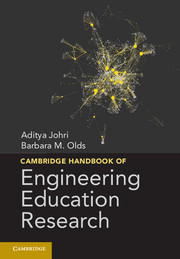Book contents
- Frontmatter
- Dedication
- Contents
- Editors
- Contributors
- Foreword
- Acknowledgments
- Introduction
- Chapter 1 Chronological and Ontological Development of Engineering Education as a Field of Scientific Inquiry
- Part 1 Engineering Thinking and Knowing
- Chapter 2 Learning Theories for Engineering Education Practice
- Chapter 3 Situative Frameworks for Engineering Learning Research
- Chapter 4 The Social Nature of Representational Engineering Knowledge
- Chapter 5 Conceptual Change and Misconceptions in Engineering Education
- Chapter 6 Engineers as Problem Solvers
- Chapter 7 Professional Engineering Work
- Part 2 Engineering Learning Mechanisms and Approaches
- Part 3 Pathways into Diversity and Inclusiveness
- Part 4 Engineering Education and Institutional Practices
- Part 5 Research Methods and Assessment
- Part 6 Cross-Cutting Issues and Perspectives
- Index
- References
Chapter 7 - Professional Engineering Work
Published online by Cambridge University Press: 05 February 2015
- Frontmatter
- Dedication
- Contents
- Editors
- Contributors
- Foreword
- Acknowledgments
- Introduction
- Chapter 1 Chronological and Ontological Development of Engineering Education as a Field of Scientific Inquiry
- Part 1 Engineering Thinking and Knowing
- Chapter 2 Learning Theories for Engineering Education Practice
- Chapter 3 Situative Frameworks for Engineering Learning Research
- Chapter 4 The Social Nature of Representational Engineering Knowledge
- Chapter 5 Conceptual Change and Misconceptions in Engineering Education
- Chapter 6 Engineers as Problem Solvers
- Chapter 7 Professional Engineering Work
- Part 2 Engineering Learning Mechanisms and Approaches
- Part 3 Pathways into Diversity and Inclusiveness
- Part 4 Engineering Education and Institutional Practices
- Part 5 Research Methods and Assessment
- Part 6 Cross-Cutting Issues and Perspectives
- Index
- References
Summary
Introduction
The focus of our chapter is on current research-based understandings of professional engineering work. We argue for the relevance of these understandings to engineering education. We will also argue, as others have as well (Barley, 2004; Trevelyan, 2007, 2010; Vinck, 2003), that research on professional engineering work is too sparse. Therefore a good part of this chapter is oriented in a programmatic, agenda setting direction.
From the perspective of engineering education, the sparseness of research on professional engineering work is puzzling for a number of reasons. First, engineering education is often reorganized against the backdrop of claims about what professional engineering work is now or will be in the future. Without trustworthy and specific representations of engineering work practice and of the dispositions, skills, and identity orientations of professional engineers, how are engineering educators to know whether engineering education is preparing engineering students to be successful, creative, or impactful engineers? A prominent consensus report from the National Academy of Engineering highlights a “disconnect between engineers in practice and engineers in academe” (National Academy of Engineering [NAE], 2005, pp. 20–21). The report stated that “the great majority of engineering faculty, for example, have no industry experience. Industry representatives point to this disconnect as the reason that engineering students are not adequately prepared, in their view, to enter today's workforce” (National Academy of Engineering [NAE], 2005, pp. 20–21). It is important that a focus on “preparation” of future engineers not be tied to an agenda that solely emphasizes what professional engineering “needs” and economic competitiveness. It also is possible to organize an engineering educational system to prepare recent graduates to be change agents and participants in new social movements within engineering work practice. However, in either case, concrete images of engineering work are critical resources for rethinking engineering education and making empirically based assessments of progress.
- Type
- Chapter
- Information
- Cambridge Handbook of Engineering Education Research , pp. 119 - 138Publisher: Cambridge University PressPrint publication year: 2014
References
- 72
- Cited by

